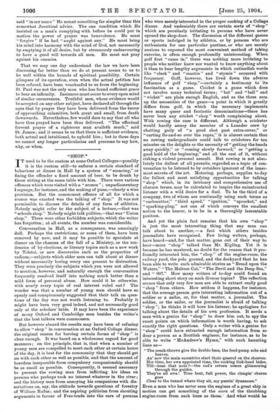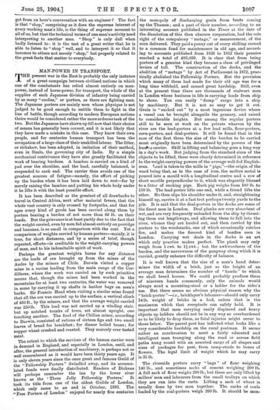I T used to be the custom at some Oxford Colleges—possibly
it is the custom still—to enforce a certain standard of behaviour at dinner in Hall by a system of " sconcing," or fining the offender a fixed amount of beer, to be drunk by those sitting at the same table with him. There were various offences which were visited with a " sconce " ; unparliamentary lmguage, for instance, and the making of puns,—clearly a wise provision. But the commonest offence of all for which a sconce was exacted was the talking of "shop." It was not permissible to discuss the details of any form of athletics. Nobody might refer to the subject of a lecture,—that was "schools shop." Nobody might talk politics,—that was "Union shop." There were other forbidden subjects, which the writer has forgotten ; at all events, the number was considerable.
Conversation in Hall, as a consequence, was amazingly dull. Perhaps the restrictions, or some of them, have been removed by now, and it may be possible to speculate at dinner on the chances of the fall of a Ministry, or the ten- dencies of by-elections, or literary topics such as a new work by Tolstoi, or new discoveries such as the properties of radium,—subjects which older men can talk about at dinner without necessarily boring every one present to distraction. They were precisely the subjects which you were not allowed to mention, however, and naturally enough the conversation frequently resolved itself into nothing much better than a mild form of personal abuse. How could it be otherwise, with nearly every topic of real interest ruled out? The wonder was that a number of young men should have so openly and conspicuously suggested that their talk on ques- tions of the day was not worth listening to. Probably it might have been very good indeed, and not necessarily good only at the scholars' table. It may have been the experience of many Oxford and Cambridge men besides the writer's that the best talkers were commoners.
But however absurd the results may- have been of refusing to allow "shop" in conversation at an Oxford College dinner, the original reason for barring certain forms of " shop " is clear enough. It was based on a wholesome regard for good manners ; on the principle, that is, that when a number of young men are compelled to meet each other at certain hours 'of the day, it is best for the community that they should get on with each other as well as possible, and that the amount of boredom inseparable from compulsory companionship should be as small as possible. Consequently, it seemed necessary to prevent the rowing man from inflicting his ideas on persons who perhaps took no interest whatever in the river; and the history man from annoying his companions with dis- sertations on, say, the attitude towards questions of forestry of William Rufus; and the aspiring politician from shouting arguments in favour of Free-trade into the ears of persons who were merely interested in the 'proper cooking of a College dinner. And undeniably there are certain sorts of "shop" which are peculiarly irritating to persons who have never opened the shop-door. The discussion of the different games or sports 'indulged in by athletes, or by persons who are enthusiasts for one particular pastime, or who are merely anxious to expound the most convenient method of taking exercise, is often enough profoundly uninteresting. When golf first "came in," there was nothing more irritating people who neither knew nor wanted to know anything about it than to hear lengthy arguments in which outlandish words like " cleek " and " mashie " and " stymie " occurred with frequency. Golf, however, has lived down the adverse influence of golf "shop,"—certainly a testimony to its fascination as a game. Cricket is a game which does not involve many technical terms ; " bat " and " ball " and "wicket" are plain enough English, and as the three sum up the necessities of the game—a point in which it greatly differs from golf, in which the necessary implements have many queer and fantastic denominations—there has never been any cricket " shop " worth complaining about. With rowing the case is different. Although a cricketer would hardly annoy the member of a Leander crew by chatting gaily of "a good shot past extra-cover," or "carting So-and-so over the ropes," it is almost certain that no rowing undergraduate could talk to cricketers for ten minutes on the delights or the necessity of " getting the hands away quickly," or "coming slowly forward," or "getting a good hold of the beginning," and all the rest of it, without risking a violent personal assault. But rowing is not abso- lutely the dullest of all pursuits, regarded as a topic -of con- versation to be listened to by outsiders ignorant of the inner- most secrets of the art. Motoring, perhaps, supplies to-day the fullest and most satisfying opportunities for talking " shop " which, in its intricacy and comprehensive use of obscure terms, may be calculated to inspire the uninstructed listener with a wild desire for a duel. To be the third of a company, two of whom are continually using such terms as "carburettor," "third speed," "ignition," "sprocket," and "sparking-plug," not one of which conveys the smallest notion to the hearer, is to be in a thoroughly lamentable position.
And yet the plain fact remains that his own " shop " is just the most interesting thing that any man can talk about to another,— a fact which others besides journalists have recognised. Few living writers, perhaps, have heard—and, for that matter, gone out of their way to hear—more " shop " talked than Mr. Kipling. Yet it is because he has mastered, no doubt for the reason that it pro- foundly interested him, the " shop " of the engine-room, the railway yard, the polo ground, and the dockyard that he has been able to write such admirable stories as "Bread upon the Waters," "The Maltese Cat," "The Devil and the Deep Sea," and "•04)7" How many writers of to-day could found an interesting short story on such diverse topics? The reflection occurs that only very few men are able to extract really good " shop " from others. How seldom it happens, for instance, that the average person gets interesting information out of a soldier or a sailor, or, for that matter, a journalist. The soldier, or the sailor, or the journalist is afraid of talking " shop "; he thinks it will bore his listener, he apologises for talking about the details of his own profession. It needs a man with a genius for " shop " to draw him out, to spy the exact points on which information is worth having, to ask exactly the right questions. Only a writer with a genius for " shop " could have extracted enough information from so dour a person as a Scottish engineer, for instance, as to be able to write " McAndrew's Hymn," with such haunting lines as- " The crank-throws give the double-bass, the feed-pump sobs and heaves,
An' now the main eccentrics start their quarrel on the sheaves: Her time, her own appointed time, the rocking link-head bides, Till—hear that note P—the rod's return comes glimmering through the guides.
They're all awa! True beat, full power, the clangin' chorus
goes Cleat to the tunnel where they sit, my purrile dynamoes."
Even a man who has never seen the engines of a great ship in motion can get something of the aura of the throbbing engine-room from such lines as these; And what would he
get from an hour's conversation with an engineer? The fact is that "shop" comprising as it does the supreme interest of pvery working man's life, is the thing of supreme moment to all of us, bat that the technical terms of one man's activity need interpreting to another man. " Shop " is only dull when badly listened to : it is the test of a great writer that he is able to listen to "shop " well, and to interpret it so that it becomes to others not merely "shop," but properly related to the great facts that matter to everybody.
MAN-POWER IN TRANSPORT.



























































 Previous page
Previous page